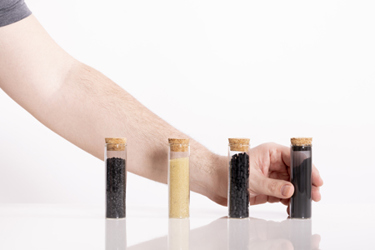Jacobi Carbons Helps Bonded Chemicals Tackle Tough Water Treatment Challenges

Bonded Chemicals, Inc. is a leading distributor of industrial and specialty chemicals serving 14 states in the Midwest and Southeast. Part of the ChemGroup, the company has built a solid reputation for providing municipal and industrial water and wastewater treatment facilities with customized solutions to meet their water quality and safety goals.
More than just a provider of commodity chemicals and materials, Bonded Chemicals takes a consultative approach to working with customers.
“We focus on solving each customer’s problem, not just meeting a specification,” says Brett McMillen, Sales Manager for Bonded Chemicals, noting that his team takes a holistic view to problem-solving. “In some cases, the issue isn’t the material they’re using to treat with, but they may be feeding it in the wrong location or not giving it enough contact time. We can use our knowledge and experience to help customers optimize their process.”
In the case of drinking water, consumer complaints about taste and odor are a common issue. This is frequently due to high levels of Geosmin and 2-methylisoborneol (MIB). While this is usually a nuisance, in some cases, levels of Total Organic Carbon (TOC) can be a compliance issue, with swift action required to meet EPA regulations.
Powdered Activated Carbon: An Effective Solution
Powdered activated carbon (PAC) is a valuable tool for addressing these contaminants. Unlike other mitigation technologies, PAC does not require major infrastructure to deploy, and it can be implemented quickly. After it has been given adequate contact time to bond with contaminants, the spent PAC is easily removed using mechanical filtration.
While Bonded Chemicals has access to a wide range of chemicals and materials, they often turn to Jacobi Carbons and its AquaSorb CB-MW series of PACs to solve customers’ water quality challenges. Depending on the specific requirement, they may recommend Jacobi’s CB1 MW, CB3-MW, or CB5-MW products. McMillen emphasizes that, when considering a PAC to specify, it’s important to look beyond the iodine number.
“You need to look at the pore structure of the product,” he says. “When you look at the Jacobi products, the proprietary carbon, the base products they use, and even their activation process have a big impact on product performance. We look at each customer situation and select the product that meets their particular need.”
Battling A Stubborn Water Quality Problem
McMillen points to the example of a city in eastern Ohio, where one of the reservoirs that provides drinking water had exceptionally high levels of Geosmin and MIB. This was causing extreme taste and odor issues—and a tremendous volume of complaints—even during the cold winter months when algae blooms are normally low.
“They were trying some other solutions and just weren’t getting good results,” McMillen recalls, noting that Bonded Chemicals recommended trying AquaSorb CB1-MW. “It was like, wow, this really worked. What made CB1-MW work was the pore structure.” The volume of complaint calls dropped dramatically.
McMillen says the city even had a number of carbon products evaluated by an independent testing lab. “Jacobi’s CB1-MW far and away outperformed the other products.” CB1-MW remains a key element in the city’s ongoing, multi-faceted process for maintaining water quality and compliance. “It has been the most cost-effective solution for them.”
McMillen emphasizes that it’s about matching the right product to each specific situation. “Based on a customer’s need and how they are feeding the carbon, we might specify CB3-MW or CB5-MW.”
Focusing On The True Cost Of Treatment
A key challenge when bidding on municipal contracts is competition from foreign PAC sources offered at lower prices. “We try to work with the treatment facility operators to ensure the language in the public bids is focused on what the ultimate goal is, not just a specification. This may include putting performance testing as a bid requirement,” McMillen explains. “We try to emphasize the idea of total cost of ownership, beyond the initial purchase price.” He notes that customer education is important to raise awareness about the factors that drive PAC performance.
While performance is crucial for any PAC, so is ensuring a reliable supply of product. As an experienced distributor, Bonded Chemicals has in-house logistics expertise and its own delivery fleet and warehousing facilities. While careful forecasting is central to its business, McMillen admits that global supply chain issues can pose challenges—something that became a particular pain point during the disruptions caused by the COVID-19 pandemic.
“We’re really at the mercy of our suppliers,” McMillen says, noting that Jacobi has been a reliable partner for more than 25 years. “We work as one with Jacobi to establish a go-to-market strategy for each opportunity. In fact, Jacobi is also a customer of ours for certain chemicals, so it’s been a great partnership.”
A Changing Treatment Landscape
Looking to the future, McMillen notes that the issue of per- and polyfluoroalkyl substances (PFAS) is increasingly on customers’ minds. With the U.S. Environmental Protection Agency (EPA) expected to introduce maximum contaminant levels for certain common PFAS compounds, water superintendents need to start thinking about mitigation strategies for these challenging “forever chemicals.”
“In our conversations with municipal customers, they are wondering what options they have and how we can help them address PFAS,” McMillen says, noting that Bonded Chemicals is working with Jacobi to explore how PAC can play a role in PFAS mitigation, along with other technologies.
No matter what the future brings, McMillen says he knows Jacobi will be there to help Bonded Chemicals solve its customers’ complex water treatment challenges. “We feature Jacobi products whenever we can,” he says. “We prefer to work with Jacobi because of the quality of their products, the expertise of their people, and their tremendous capabilities. They have been rock solid.”
Source: Jacobi Carbons
